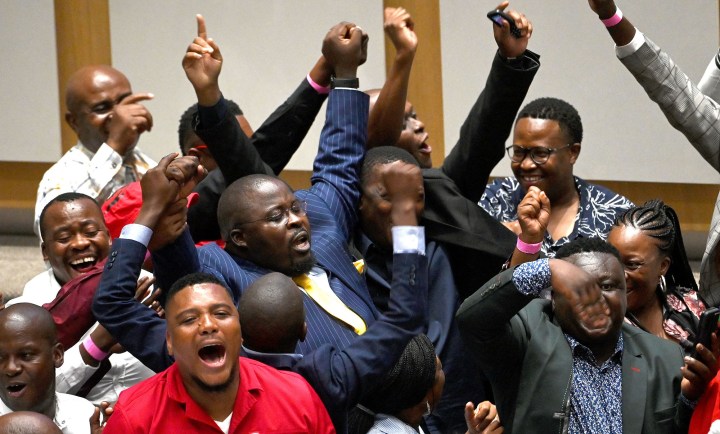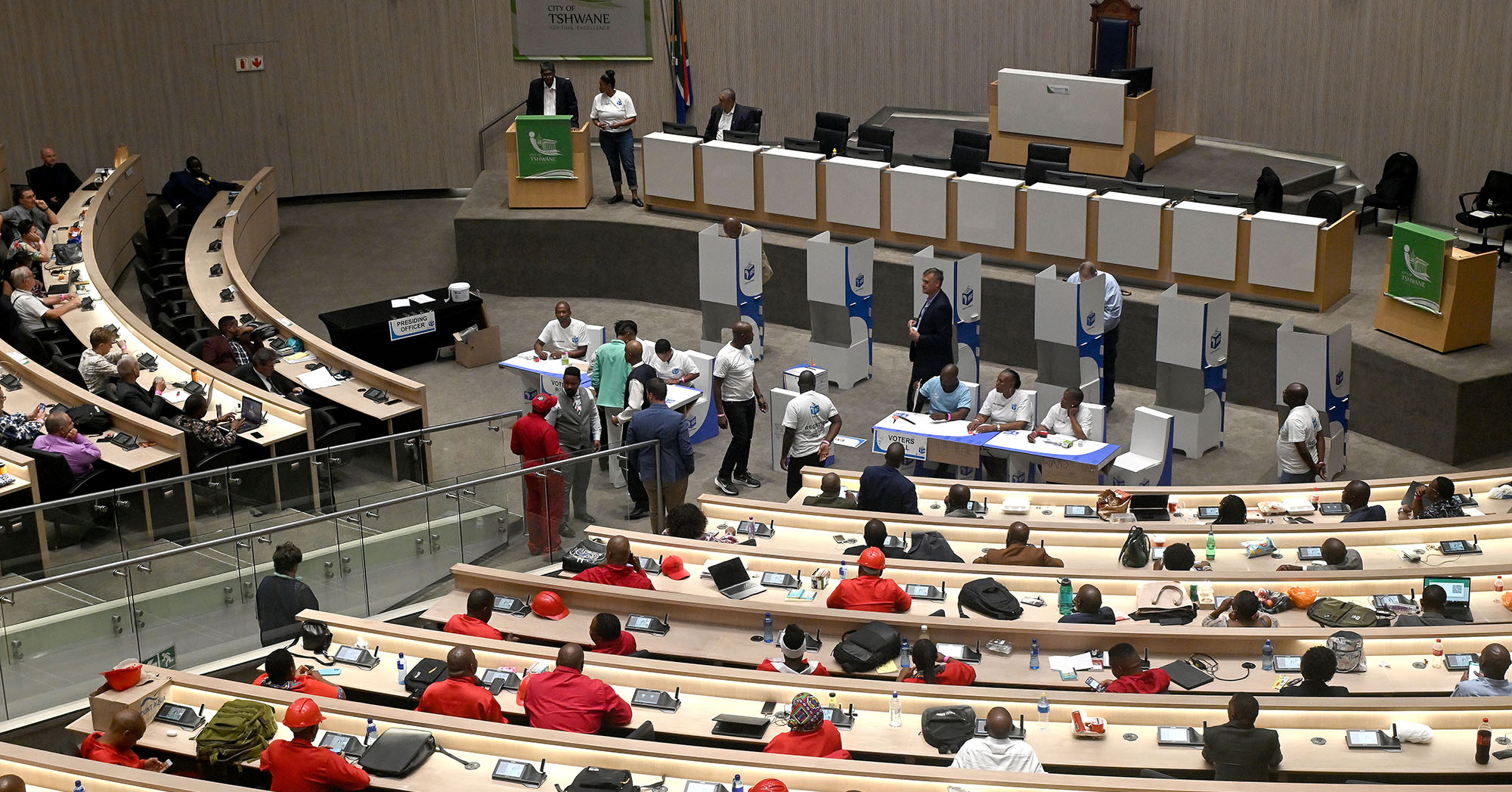ANALYSIS
Coalition votes: The true case of secret ballots vs democracy

The election of a new mayor in Tshwane has again revealed the power of secret ballots in council elections in provincial, and possibly, national government. It is a privilege likely to be much deployed in the coming age of coalitions, but should the elected representatives be allowed to keep their vote secret from the very community that voted for them?
On Tuesday evening, 28 February, councillors in Tshwane voted for Murunwa Makwarela, Cope’s lone councillor in that metro, to be elected mayor. He won the vote by 112 ballots to 102.
Considering that the parties that were part of the DA-majority coalition held more than 102 seats, it is clear that some of those members voted against the mutually agreed-on candidate.
This is a reminder of the power of secrecy, and the power of this particular provision of the Municipal Structures Act of 1998, which says that councillors must vote in secret for the position of mayor of a council.
In the National Assembly, there is no such provision. But certain votes, such as those on whether to impeach a President, are within the power of the sitting Speaker, who can make them public.
Speaker Nosiviwe Mapisa-Nqakula did not grant a secret ballot on the Phala Phala issue last year. In 2017, then Speaker Baleka Mbete granted the secret ballot in a similar motion against then president Jacob Zuma.
After Tuesday’s vote, members of the Tshwane DA were furious, speaking in angry tones about “traitors” who had betrayed them.
Read more in Daily Maverick: “Tshwane gets a new mayor – Cope’s Makwarela — as seething multiparty coalition urgently seeks answers”
It may be fun for the party’s opponents to decry this, to talk about “witch hunts”, but if it happens to this coalition it is possible that it will happen to others.
And how would Julius Malema react to being betrayed, especially if he believed his own councillors or coalition partners had done it?

Council members at the special council meeting on 28 February 2023 in Pretoria, South Africa. (Photo: Gallo Images / Beeld / Deaan Vivier)
The power granted by this secrecy is huge. It allows someone to shake hands on an agreement, even sign a formal document, only to betray that agreement in the process of voting.
In politics, this brings all sorts of advantages.
In Ekurhuleni in 2021, very few people knew that EFF councillors would vote for DA mayor Tania Campbell until the vote itself.
In Tshwane, it clearly allowed a group of people to betray an agreement. There is nothing to admire here. It allows parties to play off one possible coalition partner against the other, introducing the element of double-crossing.
Visit Daily Maverick’s home page for more news, analysis and investigations
It also creates an atmosphere of distrust. And, sometimes, parties have tried to get around this. In 2006 in the Breede Valley Municipality, for example, two parties agreed on a deal that would see their councillors sit next to each other. They would then show each other their ballot papers so that they knew each side was sticking to the deal.
The high court struck this down, suggesting the council had a duty to ensure the vote was secret.
Although there may be a focus on the relationships between parties, it also creates distrust within them.
Benefits of transparency
As has been recounted many times, the ANC has often battled to keep discipline among its councillors. As a result, certain factions have been able to vote against ANC mayoral candidates. And again, the fact there is a secret ballot has helped people to do this.
This has also happened in the National Assembly. In 2017, at least 30 MPs used a secret ballot to vote against Zuma in 2017. Although he won the vote, the fact so many ANC MPs voted against him was a sign of deep discontent and unhappiness with his leadership.
This may pose a much greater risk to parties and their own leadership in the future. Imagine a future with the ANC below 50%, if a Speaker decides, for any reason, on a secret ballot in the election of a president or a confidence vote.
The President is due to be supported by a coalition of parties, while some MPs from that coalition may be unhappy with the deal.
So, for example, EFF MPs may decide they do not want to vote for Cyril Ramaphosa as president. And if they refuse to do this, there would be no way of knowing who toed the party line and who did not.
And what would happen in a governing party if there was a secret ballot vote on a president and some of its members voted against their leader, as has happened in the past? But this time, the leader loses the vote.
It is likely a governing party would not survive the arguments over who voted which way. Transparency in voting brings immense benefits.
Last year, in a public vote, five ANC MPs voted against the party line on the Phala Phala issue. This was a good thing. First, it allowed those MPs to show their constituencies how they felt about the issue. It showed the party leadership who was doing what, and it showed voters what was really happening in the party. And no one could claim to have voted against Ramaphosa when they had not done so.
‘Vote your conscience’
All of this would have been denied to voters if the MPs had voted in secret. It would have allowed some people to claim they had voted for or against the motion when, in fact, they had done the opposite.
In short, the problem with a secret ballot in a council, or Parliament, is that it denies voters the knowledge of what their representatives, the people who vote on their behalf, do in secret.
Some argue that councillors (or MPs) should be allowed to “vote their conscience”. But why should this happen in secret? If you believe in something, then say so.
If it is particularly contentious, it is unlikely that you would be voting on your own anyway. It cannot be that a public representative is allowed to “vote their conscience” in secret.
Also, the argument that the party would then be able to remove your salary by removing you as an MP also has a weakness.
If someone has entered politics, it is presumably to improve the lives of people. If it is just to get a salary, then they are not worthy to represent the people in the first place, period and full stop.
Less about betrayal
There may be some scope for reform here. Of course, this would require MPs from different parties to agree to a change and to vote in favour.
In the longer term, it is probably in the interests of all parties to do this. It would strengthen the leaderships of these parties, and their internal discipline, to pass this measure. And it would make our politics less about betrayal.
But parties may see it as against their short-term interests.
It is likely that too many people have too much to gain from the kind of surprise – or chaos – seen in Tshwane, Johannesburg and other places.
Read more in Daily Maverick: “After the Bell: The wider significance of the DA’s humiliating loss in Tshwane is very dark”
This may be one of those situations where what is good for political parties is bad for voters. As a result, it seems very unlikely that there will be a change. This means that the secret ballot is likely to be a complicating factor in the upcoming age of coalitions.
Those who are benefiting from the use of this tactic now, may be the first to cry “traitor” when it is used against them – and they will be able to do nothing about it. DM



















 Become an Insider
Become an Insider
This is all true, and I published an article in Politikon some years back (46[2]2019) warning of the dangers of granting secret ballots to elected representatives. Unfortunately, people are not consistent – when it came to Zuma’s vote of no confidence, the secret ballot was widely deemed a virtuous counterweight to party control. As much as I wanted to see Zuma fall, it was obvious to me that this was setting a dangerous precedent that would be abused by bad actors.
Agreed It is absurd that the public representatives the voters put in power are enabled to operate “behind the electorate’s back”. Zero transparency, zero accountability, an open invite to bribery, corruption and horsetrading. Changes to these laws needed urgently
This kind of secrecy has no place in a functioning democracy. What’s good for political parties but is bad for voters is a contradictory concept for a democracy: parties and MPs are there to represent voters, although this is clearly not what’s happening in S.A. There needs to be a more direct connection between an MP and their constituency, so that they can be voted out if they are incompetent or corrupt, usually both, and hard workers can be voted in again. This centralized party system is a disaster!
Maybe there should be 2 different mechanisms…
1: A VOTE must be open and involves executive powers. Specifically to put people into a position or remove them from a position.
2: A POLL to determine if there should be furter exploration or investigation. To determine the attitude or feeling of the members regarding a certain issue.